|
Here's a little fly-by over the farm center today. Incredible to reflect on the last 4 months where we have been joined by awesome people from all corners of the globe getting deep into education and action during this unique time establishing all systems from scratch. Empowering other's to manage their lives holistically and design solutions to bring their dreams forth is a major part of the Holistic Context we manage towards, and something we are excited to be able to share with so many bright, intelligent & gifted folks. It's been an epic ride so far! With just 3 weeks left of Internship #2 and our final PDC of the season around the corner we are surely looking forward to a restful winter to recuperate and plan for next season; with more animals, new trainings and new people bringing knowledge, skills and passion to everything that happens here at Ridgedale. We will be posting more about the opportunities for Core Team roles for 2015 (sign up to the Newsletter here) with more spaces for a bigger team to make next year even more incredible. Stay posted, we'll be reviewing the year and blogging a lot more over the winter to inform & support others who wish to undertake a similar journey. Last PDC at the farm for 2014
1 Comment
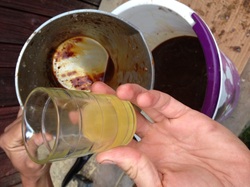 Fish hydrolysate is an awesome product for promoting plant growth. It’s high in Nitrogen, can be naturally produced, and is an awesome food for microbes. Fungi love it and it is easily produced at home. We use it as straight fertiliser, animal supplement and an ingredient in compost teas (Fungi: Bacteria balanced- Fungi orientated). Fish hydrolysate is composed of fish and glucose based sugars and uses lacto bacillus to break everything down using enzymes. Fish hydryolysate doesn’t undergo the heating and skimming process that you get with fish emulsion products. Heating breaks down beneficial amino acid chains and this cold process also retains the fats and oils that microbes love. 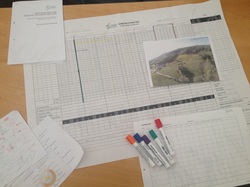 It's Day 2 of our certified Holistic Management training, dipping into the 2nd half of our awesome 10 Week Internship program. The Savory Institute has been updating, clarifying and simplifying their workbooks as smaller & more concise workbooks, available cheaply via their website. We have been running through Financial Planning and Grazing Planning today, using the farm as a model for planning for the factors, observations and circumstances we have in our situation, to ensure we create the best possible plan to move consistently towards our Holistic Context. We see managing holistically is key to forwarding effective regenerative enterprises and regenerating degraded landscapes whilst creating resilient & socially just incomes into the future. We plan to write some series of articles to clarify some of the common misconceptions and explain the process to support others to start managing holistically. Stay tuned for details.
We have another 10 Week Internship running at the farm July- Sept, with a few spots open, where once again we will be training up a diverse and engaging group in the following areas; The 10 Week internship includes over 530hrs of curriculum based learning & 5 Certificate Courses;
24/5/2014 Perennial Cropping: Silvopasture meets Forest Gardening meets Keyline Design ( soon to meet Holistic Management!)Read Now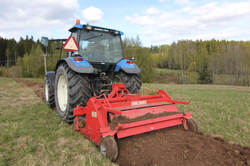 This article documents the major patterning of the farm at Ridgedale PERMACULTURE as we laid the Keyline tree lanes and planted thousands of long term perennial crops within our pasture lanes. For a better introduction to the farm's context you can read an article here. Water systems and Keyline patterning is also addressed here. The original plan for the tree layers of the farm design is outlined in another article available here. So now we explain & assess the actual implementation. For context, at the time of this work we ourselves had only been on site for 6 weeks and the planning, layout, machine work and major planting all took place in Week 1 and 2 of our 10 Week Internship. (We have another 10 Week Internship program running July- Sept) 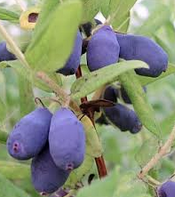 Lonicera kamschatika, haskap Lonicera kamschatika, haskap We can think of at least 180 great forest garden & perennial crops for cold climate Sweden. Want to hear about them? Over the course of the next year we will profile 5 a week on the blog. Perennial plants and crops offer a low energy, oil & resource input based foundation for future-proof agricultures. By default if an agriculture is to be called regenerative the bottom line is that it must be soil building, not soil depleting. Relentless deep tillage & poor soil husbandry (wifery?!) contributes to the majority of the 24 billion tons of topsoil lost every year on planet water. We are going to be focused on holistic polyculture grazing and perennial production at ridgedale over most of the site as this represents the most effective way to restore our degraded landscape, produce high value produce and ensure the future resource base we are managing holistically for in our decision making. 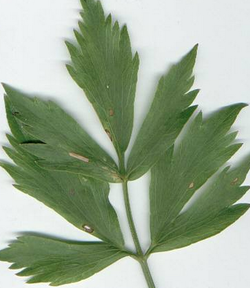 Levisticum officinale, lovage Levisticum officinale, lovage We can think of at least 180 great forest garden & perennial crops for cold climate Sweden. Want to hear about them? Over the course of the next year we will profile 5 a week on the blog. Perennial plants and crops offer a low energy, oil & resource input based foundation for future-proof agricultures. By default if an agriculture is to be called regenerative the bottom line is that it must be soil building, not soil depleting. Relentless deep tillage & poor soil husbandry (wifery?!) contributes to the majority of the 24 billion tons of topsoil lost every year on planet water. We are going to be focused on holistic polyculture grazing and perennial production at ridgedale over most of the site as this represents the most effective way to restore our degraded landscape, produce high value produce and ensure the future resource base we are managing holistically for in our decision making. 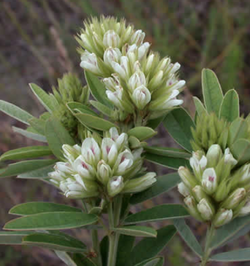 Lespedeza capitata, bush clover Lespedeza capitata, bush clover We can think of at least 180 great forest garden & perennial crops for cold climate Sweden. Want to hear about them? Over the course of the next year we will profile 5 a week on the blog. Perennial plants and crops offer a low energy, oil & resource input based foundation for future-proof agricultures. By default if an agriculture is to be called regenerative the bottom line is that it must be soil building, not soil depleting. Relentless deep tillage & poor soil husbandry (wifery?!) contributes to the majority of the 24 billion tons of topsoil lost every year on planet water. We are going to be focused on holistic polyculture grazing and perennial production at ridgedale over most of the site as this represents the most effective way to restore our degraded landscape, produce high value produce and ensure the future resource base we are managing holistically for in our decision making. 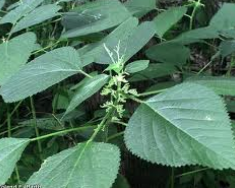 Laportaea canadensis, wood nettle Laportaea canadensis, wood nettle We can think of at least 180 great forest garden & perennial crops for cold climate Sweden. Want to hear about them? Over the course of the next year we will profile 5 a week on the blog. Perennial plants and crops offer a low energy, oil & resource input based foundation for future-proof agricultures. By default if an agriculture is to be called regenerative the bottom line is that it must be soil building, not soil depleting. Relentless deep tillage & poor soil husbandry (wifery?!) contributes to the majority of the 24 billion tons of topsoil lost every year on planet water. We are going to be focused on holistic polyculture grazing and perennial production at ridgedale over most of the site as this represents the most effective way to restore our degraded landscape, produce high value produce and ensure the future resource base we are managing holistically for in our decision making. 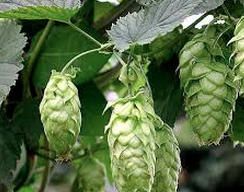 Humulus lupulus, Hops Humulus lupulus, Hops We can think of at least 180 great forest garden & perennial crops for cold climate Sweden. Want to hear about them? Over the course of the next year we will profile 5 a week on the blog. Perennial plants and crops offer a low energy, oil & resource input based foundation for future-proof agricultures. By default if an agriculture is to be called regenerative the bottom line is that it must be soil building, not soil depleting. Relentless deep tillage & poor soil husbandry (wifery?!) contributes to the majority of the 24 billion tons of topsoil lost every year on planet water. We are going to be focused on holistic polyculture grazing and perennial production at ridgedale over most of the site as this represents the most effective way to restore our degraded landscape, produce high value produce and ensure the future resource base we are managing holistically for in our decision making. 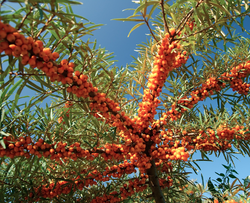 Hippophae rhamnoides, Sea Buckthorn Hippophae rhamnoides, Sea Buckthorn We can think of at least 180 great forest garden & perennial crops for cold climate Sweden. Want to hear about them? Over the course of the next year we will profile 5 a week on the blog. Perennial plants and crops offer a low energy, oil & resource input based foundation for future-proof agricultures. By default if an agriculture is to be called regenerative the bottom line is that it must be soil building, not soil depleting. Relentless deep tillage & poor soil husbandry (wifery?!) contributes to the majority of the 24 billion tons of topsoil lost every year on planet water. We are going to be focused on holistic polyculture grazing and perennial production at ridgedale over most of the site as this represents the most effective way to restore our degraded landscape, produce high value produce and ensure the future resource base we are managing holistically for in our decision making. 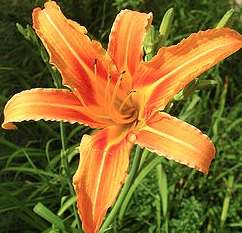 Hemerocallis spp. Day lily Hemerocallis spp. Day lily We can think of at least 180 great forest garden & perennial crops for cold climate Sweden. Want to hear about them? Over the course of the next year we will profile 5 a week on the blog. Perennial plants and crops offer a low energy, oil & resource input based foundation for future-proof agricultures. By default if an agriculture is to be called regenerative the bottom line is that it must be soil building, not soil depleting. Relentless deep tillage & poor soil husbandry (wifery?!) contributes to the majority of the 24 billion tons of topsoil lost every year on planet water. We are going to be focused on holistic polyculture grazing and perennial production at ridgedale over most of the site as this represents the most effective way to restore our degraded landscape, produce high value produce and ensure the future resource base we are managing holistically for in our decision making. 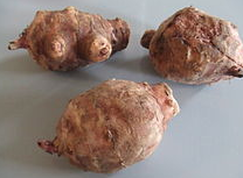 Helianthus tuberosus, Jerusalem Artichoke Helianthus tuberosus, Jerusalem Artichoke We can think of at least 180 great forest garden & perennial crops for cold climate Sweden. Want to hear about them? Over the course of the next year we will profile 5 a week on the blog. Perennial plants and crops offer a low energy, oil & resource input based foundation for future-proof agricultures. By default if an agriculture is to be called regenerative the bottom line is that it must be soil building, not soil depleting. Relentless deep tillage & poor soil husbandry (wifery?!) contributes to the majority of the 24 billion tons of topsoil lost every year on planet water. We are going to be focused on holistic polyculture grazing and perennial production at ridgedale over most of the site as this represents the most effective way to restore our degraded landscape, produce high value produce and ensure the future resource base we are managing holistically for in our decision making. 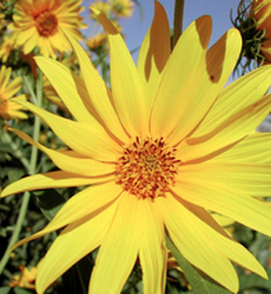 Helianthus maximiliani, Maximilian sunflower Helianthus maximiliani, Maximilian sunflower We can think of at least 180 great forest garden & perennial crops for cold climate Sweden. Want to hear about them? Over the course of the next year we will profile 5 a week on the blog. Perennial plants and crops offer a low energy, oil & resource input based foundation for future-proof agricultures. By default if an agriculture is to be called regenerative the bottom line is that it must be soil building, not soil depleting. Relentless deep tillage & poor soil husbandry (wifery?!) contributes to the majority of the 24 billion tons of topsoil lost every year on planet water. We are going to be focused on holistic polyculture grazing and perennial production at ridgedale over most of the site as this represents the most effective way to restore our degraded landscape, produce high value produce and ensure the future resource base we are managing holistically for in our decision making. 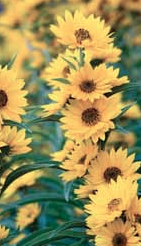 Genus Helianthus Species maximiliani Common Name Maximilian sunflower Form herb Habit running Origin North America Light sun Moisture mesic Edible roots, shoots Nectary Yes A branching perennial herb, growing from a stout rhizome and reaches heights from one half to three meters. The slender, tall, erect stems and alternately-arranged leaves are covered in rough hairs. The lance-shaped leaves are narrow, pointed, folded down the midvein, and up to 30 centimeters long on large plants. The plant reproduces by seed and by vegetative sprouting from the rhizome. The flower heads are surrounded at the base by pointed green phyllaries which often stick straight out and curl at the tips. The center is filled with yellow tipped brown disc florets and the circumference is lined with bright yellow ray florets 2 to 4 centimeters long. Tubers can be eaten raw or cooked. They are similar in flavour to Jerusalem artichokes, but lower yielding. Seed can also be eaten raw or cooked. An edible oil is obtained from the seed. The thick rhizome is edible and provided a food similar to the Jerusalem artichoke for Native American groups such as the Sioux. The flower heads are attractive to insects and the fruits are eaten by birds. The Land Institute, a perennial agriculture research center located in Salina, Kansas, run by Wes Jackson is experimenting with this species to create a perennial oilseed grain crop that does not necessitate replanting each season. OUR FRIENDS AT PFAF HAVE AN AMAZING DATABASE OF SPECIES (UK BASED);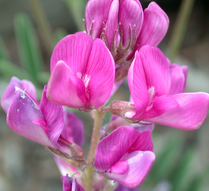 Hedysarum boreale, Sweetvetch Hedysarum boreale, Sweetvetch We can think of at least 180 great forest garden & perennial crops for cold climate Sweden. Want to hear about them? Over the course of the next year we will profile 5 a week on the blog. Perennial plants and crops offer a low energy, oil & resource input based foundation for future-proof agricultures. By default if an agriculture is to be called regenerative the bottom line is that it must be soil building, not soil depleting. Relentless deep tillage & poor soil husbandry (wifery?!) contributes to the majority of the 24 billion tons of topsoil lost every year on planet water. We are going to be focused on holistic polyculture grazing and perennial production at ridgedale over most of the site as this represents the most effective way to restore our degraded landscape, produce high value produce and ensure the future resource base we are managing holistically for in our decision making. 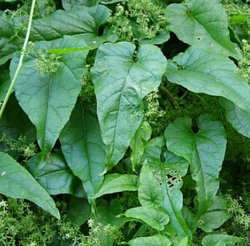 Hablitzia tamnoides, Caucasian spinach Hablitzia tamnoides, Caucasian spinach We can think of at least 180 great forest garden & perennial crops for cold climate Sweden. Want to hear about them? Over the course of the next year we will profile 5 a week on the blog. Perennial plants and crops offer a low energy, oil & resource input based foundation for future-proof agricultures. By default if an agriculture is to be called regenerative the bottom line is that it must be soil building, not soil depleting. Relentless deep tillage & poor soil husbandry (wifery?!) contributes to the majority of the 24 billion tons of topsoil lost every year on planet water. We are going to be focused on holistic polyculture grazing and perennial production at ridgedale over most of the site as this represents the most effective way to restore our degraded landscape, produce high value produce and ensure the future resource base we are managing holistically for in our decision making. 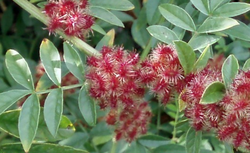 We can think of at least 180 great forest garden & perennial crops for cold climate Sweden. Want to hear about them? Over the course of the next year we will profile 5 a week on the blog. Perennial plants and crops offer a low energy, oil & resource input based foundation for future-proof agricultures. By default if an agriculture is to be called regenerative the bottom line is that it must be soil building, not soil depleting. Relentless deep tillage & poor soil husbandry (wifery?!) contributes to the majority of the 24 billion tons of topsoil lost every year on planet water. We are going to be focused on holistic polyculture grazing and perennial production at ridgedale over most of the site as this represents the most effective way to restore our degraded landscape, produce high value produce and ensure the future resource base we are managing holistically for in our decision making. 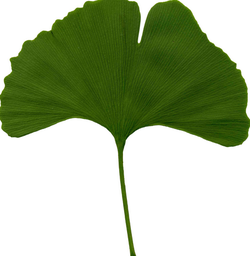 Ginkgo biloba, ginkgo Ginkgo biloba, ginkgo We can think of at least 180 great forest garden & perennial crops for cold climate Sweden. Want to hear about them? Over the course of the next year we will profile 5 a week on the blog. Perennial plants and crops offer a low energy, oil & resource input based foundation for future-proof agricultures. By default if an agriculture is to be called regenerative the bottom line is that it must be soil building, not soil depleting. Relentless deep tillage & poor soil husbandry (wifery?!) contributes to the majority of the 24 billion tons of topsoil lost every year on planet water. We are going to be focused on holistic polyculture grazing and perennial production at ridgedale over most of the site as this represents the most effective way to restore our degraded landscape, produce high value produce and ensure the future resource base we are managing holistically for in our decision making. 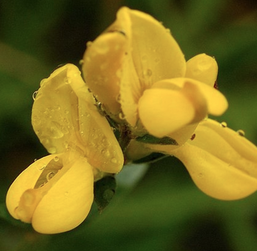 Genista tinctoria, Dyers greenwood Genista tinctoria, Dyers greenwood We can think of at least 180 great forest garden & perennial crops for cold climate Sweden. Want to hear about them? Over the course of the next year we will profile 5 a week on the blog. Perennial plants and crops offer a low energy, oil & resource input based foundation for future-proof agricultures. By default if an agriculture is to be called regenerative the bottom line is that it must be soil building, not soil depleting. Relentless deep tillage & poor soil husbandry (wifery?!) contributes to the majority of the 24 billion tons of topsoil lost every year on planet water. We are going to be focused on holistic polyculture grazing and perennial production at ridgedale over most of the site as this represents the most effective way to restore our degraded landscape, produce high value produce and ensure the future resource base we are managing holistically for in our decision making. 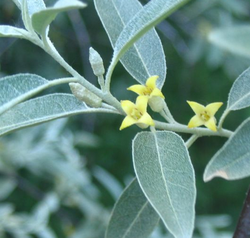 We can think of at least 180 great forest garden & perennial crops for cold climate Sweden. Want to hear about them? Over the course of the next year we will profile 5 a week on the blog. Perennial plants and crops offer a low energy, oil & resource input based foundation for future-proof agricultures. By default if an agriculture is to be called regenerative the bottom line is that it must be soil building, not soil depleting. Relentless deep tillage & poor soil husbandry (wifery?!) contributes to the majority of the 24 billion tons of topsoil lost every year on planet water. We are going to be focused on holistic polyculture grazing and perennial production at ridgedale over most of the site as this represents the most effective way to restore our degraded landscape, produce high value produce and ensure the future resource base we are managing holistically for in our decision making. 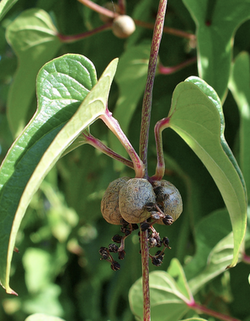 Dioscorea opposita, Chinese yam Dioscorea opposita, Chinese yam We can think of at least 180 great forest garden & perennial crops for cold climate Sweden. Want to hear about them? Over the course of the next year we will profile 5 a week on the blog. Perennial plants and crops offer a low energy, oil & resource input based foundation for future-proof agricultures. By default if an agriculture is to be called regenerative the bottom line is that it must be soil building, not soil depleting. Relentless deep tillage & poor soil husbandry (wifery?!) contributes to the majority of the 24 billion tons of topsoil lost every year on planet water. We are going to be focused on holistic polyculture grazing and perennial production at ridgedale over most of the site as this represents the most effective way to restore our degraded landscape, produce high value produce and ensure the future resource base we are managing holistically for in our decision making. 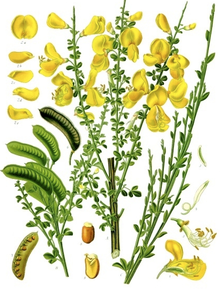 Cytisus scoparius, Scotch broom Cytisus scoparius, Scotch broom We can think of at least 180 great forest garden & perennial crops for cold climate Sweden. Want to hear about them? Over the course of the next year we will profile 5 a week on the blog. Perennial plants and crops offer a low energy, oil & resource input based foundation for future-proof agricultures. By default if an agriculture is to be called regenerative the bottom line is that it must be soil building, not soil depleting. Relentless deep tillage & poor soil husbandry (wifery?!) contributes to the majority of the 24 billion tons of topsoil lost every year on planet water. We are going to be focused on holistic polyculture grazing and perennial production at ridgedale over most of the site as this represents the most effective way to restore our degraded landscape, produce high value produce and ensure the future resource base we are managing holistically for in our decision making. 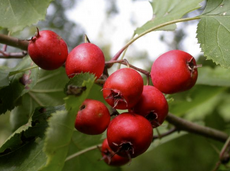 Crataegus ellwangeriana, hawthorn Crataegus ellwangeriana, hawthorn We can think of at least 180 great forest garden & perennial crops for cold climate Sweden. Want to hear about them? Over the course of the next year we will profile 5 a week on the blog. Perennial plants and crops offer a low energy, oil & resource input based foundation for future-proof agricultures. By default if an agriculture is to be called regenerative the bottom line is that it must be soil building, not soil depleting. Relentless deep tillage & poor soil husbandry (wifery?!) contributes to the majority of the 24 billion tons of topsoil lost every year on planet water. We are going to be focused on holistic polyculture grazing and perennial production at ridgedale over most of the site as this represents the most effective way to restore our degraded landscape, produce high value produce and ensure the future resource base we are managing holistically for in our decision making. 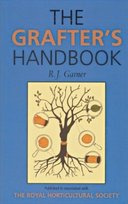 R.J Garners "The Grafters Handbook" has long considered the bible for professional horticulturists and hobbyists alike, and offers a comprehensive grafting course, accompanied by line drawings and photographs that provide a vivid visual reference. Topics include using rootstocks from seed and cuttings, identifying viruses, and grafting established trees. It's an awesome book and with grafting season approaching we thought this would be a great way to celebrate moving to the farm. If you want a copy just post a comment of how it would benefit you and we'll pick out a lucky winner at the end oof the week and zip you a copy.... 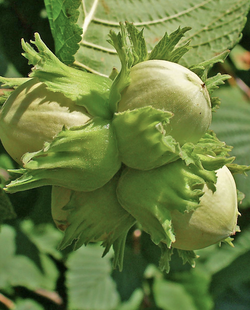 Corylus spp. (here avellana), hazel Corylus spp. (here avellana), hazel We can think of at least 180 great forest garden & perennial crops for cold climate Sweden. Want to hear about them? Over the course of the next year we will profile 5 a week on the blog. Perennial plants and crops offer a low energy, oil & resource input based foundation for future-proof agricultures. By default if an agriculture is to be called regenerative the bottom line is that it must be soil building, not soil depleting. Relentless deep tillage & poor soil husbandry (wifery?!) contributes to the majority of the 24 billion tons of topsoil lost every year on planet water. We are going to be focused on holistic polyculture grazing and perennial production at ridgedale over most of the site as this represents the most effective way to restore our degraded landscape, produce high value produce and ensure the future resource base we are managing holistically for in our decision making. 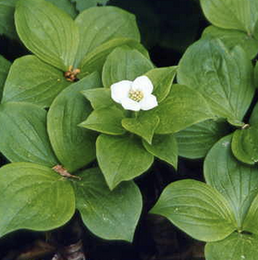 Cornus canadensis, bunchberry shrub Cornus canadensis, bunchberry shrub We can think of at least 180 great forest garden & perennial crops for cold climate Sweden. Want to hear about them? Over the course of the next year we will profile 5 a week on the blog. Perennial plants and crops offer a low energy, oil & resource input based foundation for future-proof agricultures. By default if an agriculture is to be called regenerative the bottom line is that it must be soil building, not soil depleting. Relentless deep tillage & poor soil husbandry (wifery?!) contributes to the majority of the 24 billion tons of topsoil lost every year on planet water. We are going to be focused on holistic polyculture grazing and perennial production at ridgedale over most of the site as this represents the most effective way to restore our degraded landscape, produce high value produce and ensure the future resource base we are managing holistically for in our decision making. |
Details
Like us on FB Below for regular updatesStay up to date with customized updates you want to receive
Upcoming coursesArchives
December 2016
Categories
All
|
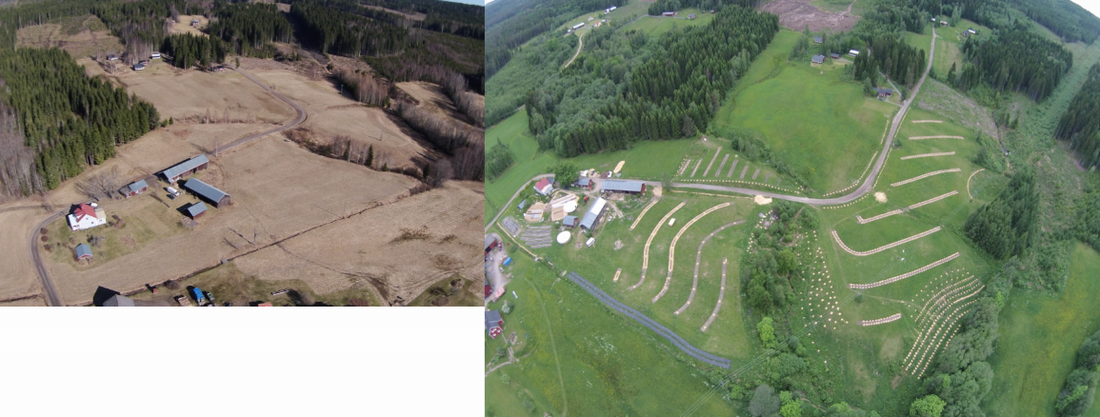


 RSS Feed
RSS Feed